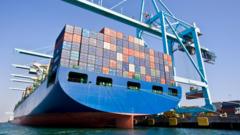Honda's recent decision to relocate SUV production from Canada to the U.S. amid soaring tariffs marks a significant challenge for Prime Minister Mark Carney, coinciding with the cancellation of plans for a major electric vehicle factory in Canada.
Honda’s Shift: U.S. Tariffs Propel SUV Production Move from Canada

Honda’s Shift: U.S. Tariffs Propel SUV Production Move from Canada
In light of U.S. tariffs, Honda re-evaluates its Canadian production strategy, canceling plans for electric vehicle expansion while shifting SUV manufacturing stateside.
In a striking development amid ongoing trade tensions, Honda announced on Monday that it would be relocating production of its popular CR-V SUV from Ontario to a manufacturing facility in the United States. This decision also includes the postponement of a significant $11 billion investment meant for establishing electric vehicle and battery production in Canada. Just weeks prior, Honda had refuted a media report suggesting that tariffs imposed by President Trump would lead to such a pullback.
This shift poses a considerable challenge for Canada’s newly-elected Prime Minister Mark Carney, who recently secured victory by positioning himself as the ideal candidate to navigate through the complexities of U.S.-Canada trade disputes. The U.S. has enacted a hefty 25 percent tariff on a wide array of Canadian vehicles and auto parts, prompting a reevaluation of production strategies among automakers.
Honda's CEO, Toshiro Mibe, stated during a news conference that the decision aligns with the company's efforts to "optimize" production operations to mitigate the impact of tariffs. Moreover, sluggish growth within the electric vehicle sector contributed to the choice to delay the substantial expansion project that was supported by various governmental incentives and hailed as a historical investment in Canada’s automotive landscape.
While the precise ramifications of the CR-V production shift remain to be seen, it is noteworthy that most Canadian-made CR-Vs are exported to the U.S. Currently, Honda employs about 4,200 workers at its Alliston, Ontario plant, which also manufactures Civic sedans and engines.
Carney’s office has yet to respond officially to Honda’s announcement, which arrives as his administration prepares for the swearing-in of a new cabinet. Furthermore, Honda's decision reflects a broader trend in the auto industry as several companies, including Stellantis and General Motors, recently curtailed expansion plans in Canada in response to U.S. tariffs. Ford’s Canadian assembly operations have also faced significant disruptions, shifting focus from electric vehicle production to gasoline-powered truck manufacturing.
Ian Austen, a seasoned journalist based in Ottawa, has been covering Canadian culture, politics, and societal aspects for over two decades, offering insightful perspectives on current events.




















